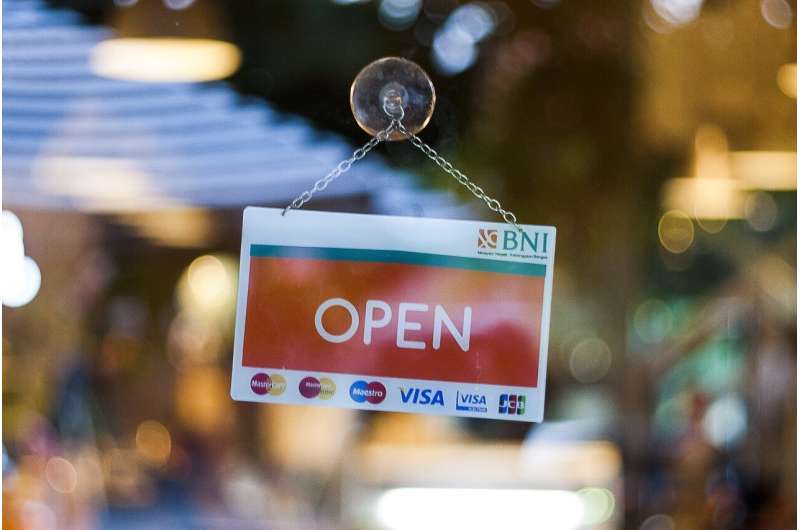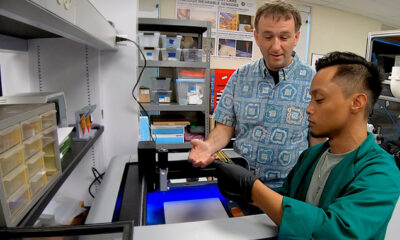Science
Retail Workers Seek Compassion During Busy Season with New Campaign

More than 1.4 million individuals are employed in Australia’s retail and fast food sectors, yet many face verbal abuse from customers. A recent survey conducted by the Shop, Distributive and Allied Employees’ Association (SDA) revealed that in 2023, a staggering 87% of frontline employees experienced verbal abuse, a figure that has remained consistent since 2016. Alarmingly, the frequency of these incidents has increased, with 76% of those abused reporting daily, weekly, or monthly occurrences, compared to just 54% two years prior.
As the holiday season approaches, the risk of customer aggression intensifies. In response, a coalition of retail groups has launched a national campaign titled “Be Kind in Retail,” advocating for compassion and patience among shoppers during this busy period.
One low-cost initiative, first introduced in 2017, aims to address the issue of customer abuse through personal connection. The SDA’s “No One Deserves a Serve” campaign includes the distribution of adhesive plastic “under badges” that workers can attach to their name tags. These badges feature short, humanizing messages such as “I’m a mother” or “I’m a son,” with the goal of fostering empathy among customers.
Research Findings on Humanization
Recent research led by Gary Mortimer and his team explored the effectiveness of these under badges. Their study involved interviews with 17 supermarket workers participating in the campaign. Although some workers expressed discomfort with wearing personal phrases, many reported that the badges reduced instances of verbal abuse and opened avenues for conversation with customers.
One worker shared, “I recall this old fellow coming in and carrying on… and then he just calms down when he sees that I’m a mother. It was like I suddenly became a real person, not just a worker.”
To further investigate, the researchers conducted experiments with 940 customers. They presented scenarios that provoked anger and then showcased images of retail workers with and without under badges. The findings indicated that while the badges did not eliminate verbal abuse entirely, there was a notable reduction in customers’ inclination to engage in such behavior when personal information was disclosed.
The second phase of the experiment involved changing the under badge to read “I’m a local,” confirming that any form of self-disclosure significantly lessened customer aggression.
Understanding the Impact of Personal Connection
The research highlights two key theories that explain why personal revelations can enhance respect and empathy in customer interactions. The first, social penetration theory, suggests that relationships deepen as individuals share more personal information, weighing the emotional rewards against perceived vulnerabilities. The second, social exchange theory, posits that when the perceived rewards of an interaction outweigh the costs, engagement continues.
This dynamic creates a situation where customers feel they learn something about the worker, fostering a connection that humanizes the retail employee rather than viewing them as merely a representative of the store.
Despite the positive feedback, the use of under badges has dwindled over the years, with fewer workers seen wearing them in stores. The SDA reports that they continue to distribute these badges, which can cost as little as AUD 0.17 each for large orders. This minimal investment could significantly enhance the treatment of retail workers, ensuring they are seen as equals deserving of respect during the demanding holiday season.
As retailers continue to seek solutions to enhance workplace safety and customer relations, initiatives like the “No One Deserves a Serve” campaign may prove essential in fostering a more supportive environment for both employees and customers alike.
-

 Science3 months ago
Science3 months agoUniversity of Hawaiʻi Joins $25.6M AI Project to Monitor Disasters
-

 Business3 months ago
Business3 months agoForeign Inflows into Japan Stocks Surge to ¥1.34 Trillion
-

 Entertainment2 months ago
Entertainment2 months agoHudson Williams Gains Popularity as Breakout Star on Heated Rivalry
-

 World3 months ago
World3 months agoBoeing’s Merger with McDonnell Douglas: A Strategic Move Explained
-

 Science2 months ago
Science2 months ago$1.25M Grant Advances Hawaiʻi’s Real-Time Hazard Monitoring
-

 Entertainment3 months ago
Entertainment3 months agoSydney Sweeney Embraces Body Positivity Amid Hollywood Challenges
-

 Top Stories3 months ago
Top Stories3 months agoBOYNEXTDOOR’s Jaehyun Faces Backlash Amid BTS-TWICE Controversy
-

 Top Stories3 months ago
Top Stories3 months agoUrgent Farewell: Joleen Chaney Leaves Legacy at KFOR
-

 World3 months ago
World3 months agoFrench Film Explores Group Therapy in ‘Group – The Schopenhauer Project’
-

 Top Stories3 months ago
Top Stories3 months agoMarc Buoniconti’s Legacy: 40 Years Later, Lives Transformed
-

 Lifestyle4 months ago
Lifestyle4 months agoKelsea Ballerini Launches ‘Burn the Baggage’ Candle with Ranger Station
-

 Top Stories3 months ago
Top Stories3 months agoCarson Wentz Out for Season After Shoulder Surgery: Urgent Update









